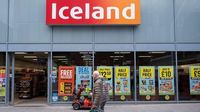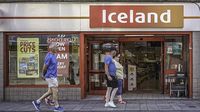Supermarket chain Iceland has launched a bold new initiative in response to soaring shoplifting rates, offering customers a £1 reward for reporting thefts in progress. The move, announced by executive chairman Richard Walker on August 14, 2025, is the first of its kind in the UK and has already sparked debate about the role of the public in tackling retail crime.
Walker made the announcement during an appearance on Channel 5 News, stating, "I’d like to announce that we will give £1 to any customer who points out a shoplifter. We’ll put it on their bonus card if they see any customer in our stores who is undertaking that offence." According to BBC News, the scheme is designed to encourage shoppers to alert staff when they witness a theft, with the reward credited directly to their Iceland Bonus Card once the incident is reported and verified. Importantly, customers are not required to apprehend the shoplifter themselves—simply reporting and providing a detailed description to staff is enough.
The financial motivation behind the initiative is clear. Iceland estimates that shoplifting costs the business around £20 million each year, a figure Walker says not only impacts the company's bottom line but also restricts its ability to lower prices and reinvest in staff wages. "That’s not £20 million of profit. That’s just £20 million that we could pay in more hours to our colleagues or in lowering prices," Walker emphasized, as reported by The Independent. He added, "We’d like customers to help us lower our prices even more by pointing out shoplifters and then we’ll give them a quid back."
Walker is adamant that shoplifting is far from a victimless crime. "Some people see this as a victimless crime; it is not," he told Channel 5 News. "It’s a cost to the business, to the hours we pay our colleagues, and it involves intimidation and violence." According to The Daily Mail, the supermarket chief hopes that involving customers directly in crime prevention will not only deter would-be thieves but also foster a sense of shared responsibility within local communities.
The supermarket has made it clear that it does not want customers to intervene directly or confront suspected shoplifters. Instead, Iceland advises shoppers to find the nearest member of staff and provide a detailed description of the individual involved. This approach aims to keep both staff and customers safe while still empowering the public to take an active role in protecting their local stores.
The new scheme comes amid a dramatic rise in shoplifting across England and Wales. According to the Office for National Statistics, police recorded 530,643 shoplifting offences in the year to March 2025—a staggering 20% increase from the previous year’s 444,022 offences. This figure marks the highest level since current police recording practices began in 2002-03. Retail bosses, including James Lowman, CEO of the Association of Convenience Stores, have warned that shop theft is "spiraling out of control." Lowman also noted that, despite increased reporting, many retailers have “no faith” that incidents will be properly investigated.
It's not just supermarkets feeling the pressure. BBC News reports that nine in ten pharmacies have also experienced a rise in shoplifting and aggression toward staff over the past year. The surge in retail crime has led to growing calls for more robust action from both businesses and government.
Victims minister Alex Davies-Jones weighed in on the issue during an interview with BBC Radio 4’s Today programme on August 11, 2025. She described the current situation as having "got out of hand" and stressed the importance of community awareness. When asked about whether it was appropriate to display images of known shoplifters in shop windows, Davies-Jones replied, "It’s on all of us to be aware of what is going on in our local communities."
In response to the escalating crisis, the UK government has pledged to bolster neighbourhood policing, promising thousands more officers on patrol by spring 2026. The move is intended to reassure both retailers and the public that the authorities are taking the issue seriously and are committed to restoring order on the high street.
The debate over how best to tackle shoplifting has also drawn in senior police figures. Matthew Barber, the Conservative Police and Crime Commissioner for Thames Valley, has encouraged both the public and shop owners to take a more active stance. At a June 2025 meeting of the Thames Valley police and crime panel, Barber said, "If you’ve got someone in your store now stealing from you, call 999. Also ideally try and stop them leaving, don’t just stand there and watch, which a lot of people do, which frustrates me." While he stopped short of urging people to physically intervene, Barber criticized what he described as a "very poor society" where bystanders simply film incidents rather than taking action.
Recent incidents have highlighted the risks faced by retail staff. In May 2025, an Iceland security guard in Walworth, south-east London, was filmed using a shopping basket as a shield to fend off a suspected thief aiming kicks at him. The confrontation, caught on a customer’s phone, ended with the suspected offender fleeing the scene. Such episodes underscore the dangers of retail crime and the urgent need for effective prevention strategies.
Iceland’s new scheme has drawn both praise and skepticism. Supporters argue that it empowers communities and could serve as a deterrent to would-be thieves. Critics, however, question whether it places too much responsibility on ordinary shoppers and whether it will have a meaningful impact without broader systemic changes. As James Lowman of the Association of Convenience Stores pointed out, many retailers remain skeptical that increased reporting alone will lead to more effective investigations or prosecutions.
Despite the controversy, Richard Walker remains optimistic that the initiative will make a difference. "We’re encouraging our loyal customers to help sound the alarm, and if they do help to catch a shoplifter, we’ll top up their Bonus Card to spend in store," he reiterated. The hope is that by working together, retailers and the public can push back against the rising tide of shoplifting and create safer, more affordable shopping environments for everyone.
As the debate continues and the government’s promised policing measures take shape, all eyes will be on Iceland to see whether its innovative approach can help turn the tide on retail crime—or whether more drastic action will be needed to protect Britain’s beleaguered high streets.






